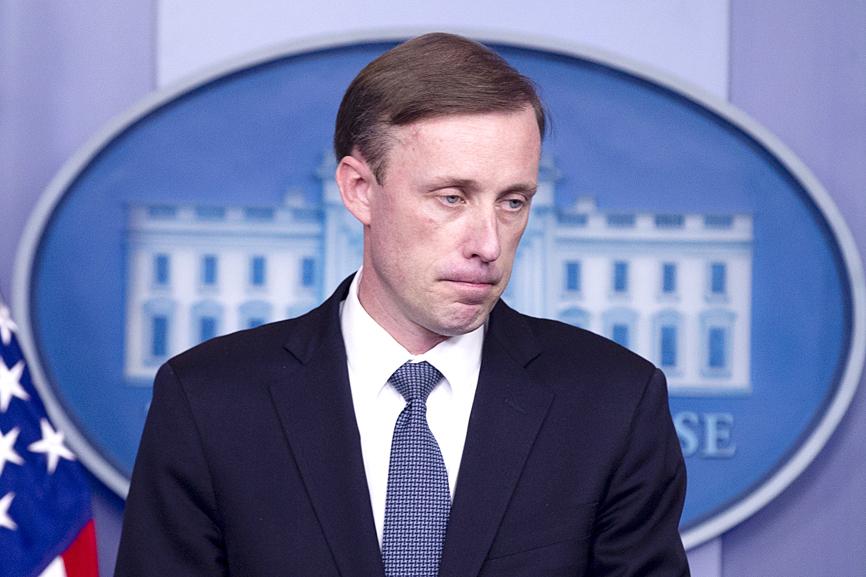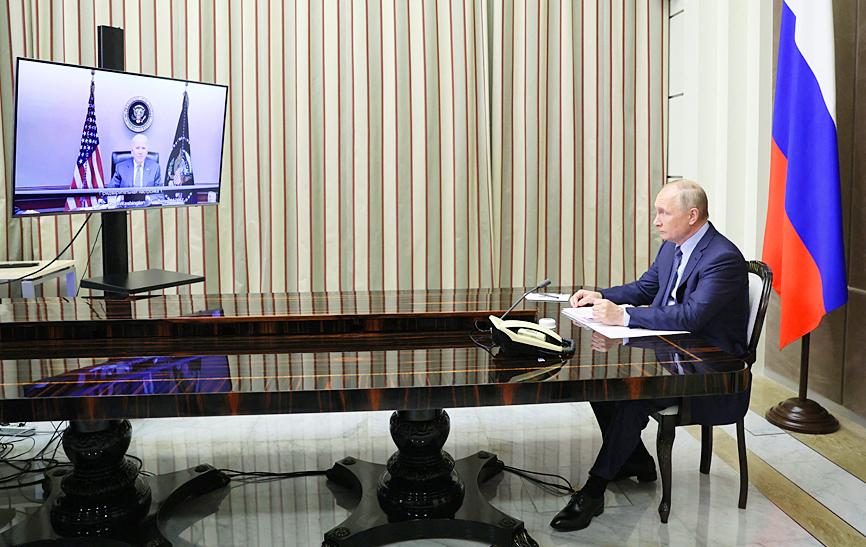The US “will take every action” in diplomacy and deterrence to prevent the forcible unification of Taiwan by China in concurrence with a hypothetical Russian invasion of Ukraine, US National Security Adviser Jake Sullivan said on Tuesday.
Sullivan made the comment at a White House news conference following a teleconference between US President Joe Biden and Russian President Vladimir Putin earlier that day over the military standoff between Russia and Ukraine.
A reporter asked: “Some observers have described a nightmare scenario where President Putin invades Ukraine and also, simultaneously, President Xi [Jinping, 習近平] uses force to ‘reunify’ Taiwan with China. Is the US prepared to deal with such a scenario?”

Photo: EPA-EFE
“The United States is going to take every action that we can take, from the point of view of both deterrence and diplomacy, to make sure that the Taiwan scenario you just described never happens and to try to avert the invasion and deter the invasion into Ukraine,” Sullivan said.
“The sum total of the efforts we have undertaken over the course of the past eight months in the Indo-Pacific have also all been geared towards avoiding any kind of scenario where China chooses to invade,” he said.
Biden and Putin were still far apart after their two hours of talks on a crisis caused by Moscow massing of tens of thousands of troops near the border with Ukraine.

Photo: AFP
Biden delivered a simple message: Invade Ukraine again and face painful sanctions that will do resounding harm to your economy.
Putin had his own blunt take, telling the US president that “the Russian troops are on their own territory, and they don’t threaten anyone,” said Yuri Ushakov, who advises Putin on foreign affairs.
With no immediate breakthrough to ease tensions on the Ukraine question, the US emphasized a need for diplomacy and de-escalation, while issuing stern threats to Russia about the high costs of a military incursion.
Biden “told President Putin directly that if Russia further invades Ukraine, the United States and our European allies would respond with strong economic measures,” Sullivan said.
Biden told Putin that the US would also “provide additional defensive material to the Ukrainians ... and we would fortify our NATO allies on the eastern flank with additional capabilities in response to such an escalation,” Sullivan said.
White House officials said that Biden is not interested in sending US troops to defend Ukraine.
However, Sullivan said that potential efforts to bolster regional allies could lead to additional deployments of troops to eastern European NATO allies.
Ushakov dismissed the sanctions threat during his own comments to reporters following the leaders’ meeting.
“While the US president talked about possible sanctions, our president emphasized what Russia needs,” Ushakov said. “Sanctions aren’t something new, they have been in place for a long time and will not have any effect.”
He described the presidents’ video conference as “candid and businesslike,” adding that they also exchanged occasional jokes.
In a brief snippet of the start of their meeting that was broadcast by Russian state television, the two leaders offered friendly greetings to each other.
“I welcome you, Mr President,” Putin said, speaking with a Russian flag behind him and a video monitor showing Biden in front of him.
At the White House, Sullivan called it “a useful meeting,” allowing Biden to lay out in candid terms where Washington stands.
Sullivan said that Biden and Putin had a “good discussion” on efforts to prevent Iran from becoming a nuclear power and called it an area where the two countries could cooperate.
“The more Iran demonstrates a lack of seriousness at the negotiating table,” the more there will be a sense of unity among the US and the parties to the 2015 nuclear accord, including Russia and the EU, he said.
Additional reporting by staff writer

A Ministry of Foreign Affairs official yesterday said that a delegation that visited China for an APEC meeting did not receive any kind of treatment that downgraded Taiwan’s sovereignty. Department of International Organizations Director-General Jonathan Sun (孫儉元) said that he and a group of ministry officials visited Shenzhen, China, to attend the APEC Informal Senior Officials’ Meeting last month. The trip went “smoothly and safely” for all Taiwanese delegates, as the Chinese side arranged the trip in accordance with long-standing practices, Sun said at the ministry’s weekly briefing. The Taiwanese group did not encounter any political suppression, he said. Sun made the remarks when

The Taiwanese passport ranked 33rd in a global listing of passports by convenience this month, rising three places from last month’s ranking, but matching its position in January last year. The Henley Passport Index, an international ranking of passports by the number of designations its holder can travel to without a visa, showed that the Taiwan passport enables holders to travel to 139 countries and territories without a visa. Singapore’s passport was ranked the most powerful with visa-free access to 192 destinations out of 227, according to the index published on Tuesday by UK-based migration investment consultancy firm Henley and Partners. Japan’s and

BROAD AGREEMENT: The two are nearing a trade deal to reduce Taiwan’s tariff to 15% and a commitment for TSMC to build five more fabs, a ‘New York Times’ report said Taiwan and the US have reached a broad consensus on a trade deal, the Executive Yuan’s Office of Trade Negotiations said yesterday, after a report said that Washington is set to reduce Taiwan’s tariff rate to 15 percent. The New York Times on Monday reported that the two nations are nearing a trade deal to reduce Taiwan’s tariff rate to 15 percent and commit Taiwan Semiconductor Manufacturing Co (TSMC, 台積電) to building at least five more facilities in the US. “The agreement, which has been under negotiation for months, is being legally scrubbed and could be announced this month,” the paper said,

MIXED SOURCING: While Taiwan is expanding domestic production, it also sources munitions overseas, as some, like M855 rounds, are cheaper than locally made ones Taiwan and the US plan to jointly produce 155mm artillery shells, as the munition is in high demand due to the Ukraine-Russia war and should be useful in Taiwan’s self-defense, Armaments Bureau Director-General Lieutenant General Lin Wen-hsiang (林文祥) told lawmakers in Taipei yesterday. Lin was responding to questions about Taiwan’s partnership with allies in producing munitions at a meeting of the legislature’s Foreign Affairs and National Defense Committee. Given the intense demand for 155mm artillery shells in Ukraine’s defense against the Russian invasion, and in light of Taiwan’s own defensive needs, Taipei and Washington plan to jointly produce 155mm shells, said Lin,